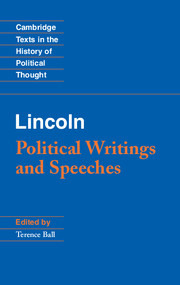Book contents
- Frontmatter
- Contents
- Preface
- Introduction
- Chronology
- Biographical synopses
- A note on sources and abbreviations
- Bibliographical note
- I Political Writings and Speeches
- 1 Autobiographical sketch
- 2 “The Perpetuation of Our Political Institutions”
- 3 Limits of Presidential Power
- 4 Speech on the Kansas–Nebraska Act
- 5 To Joshua F. Speed
- 6 Speech on the Dred Scott Decision
- 7 “A House Divided” Speech
- 8 Portion of a Speech at Edwardsville, Illinois
- 9 Seventh Lincoln–Douglas Debate
- 10 On Thomas Jefferson
- 11 Cooper Union Address
- 12 Speech at Indianapolis, Indiana
- 13 Speech at Independence Hall, Philadelphia, Pennsylvania
- 14 First Inaugural Address
- 15 Message to Congress in Special Session
- 16 Appeal to Border-State Representatives for Compensated Emancipation
- 17 Address on Colonization to a Committee of Colored Men
- 18 To Horace Greeley
- 19 Preliminary Emancipation Proclamation
- 20 Proclamation Suspending the Writ of Habeas Corpus
- 21 Second Annual Message to Congress
- 22 Final Emancipation Proclamation
- 23 To General John A. McClernand
- 24 To Erastus Corning and Others
- 25 To Matthew Birchard and Others
- 26 To James C. Conkling
- 27 The Gettysburg Address
- 28 Third Annual Message to Congress
- 29 Proclamation of Amnesty and Reconstruction
- 30 Reply to the New York Working-men’s Democratic Republican Association
- 31 To Albert G. Hodges
- 32 To Charles D. Robinson
- 33 Reply to a Southern Woman
- 34 “With Malice toward None”
- 35 Speech on Reconstruction
- II Notes and Fragments
- Index
17 - Address on Colonization to a Committee of Colored Men
Published online by Cambridge University Press: 05 April 2013
- Frontmatter
- Contents
- Preface
- Introduction
- Chronology
- Biographical synopses
- A note on sources and abbreviations
- Bibliographical note
- I Political Writings and Speeches
- 1 Autobiographical sketch
- 2 “The Perpetuation of Our Political Institutions”
- 3 Limits of Presidential Power
- 4 Speech on the Kansas–Nebraska Act
- 5 To Joshua F. Speed
- 6 Speech on the Dred Scott Decision
- 7 “A House Divided” Speech
- 8 Portion of a Speech at Edwardsville, Illinois
- 9 Seventh Lincoln–Douglas Debate
- 10 On Thomas Jefferson
- 11 Cooper Union Address
- 12 Speech at Indianapolis, Indiana
- 13 Speech at Independence Hall, Philadelphia, Pennsylvania
- 14 First Inaugural Address
- 15 Message to Congress in Special Session
- 16 Appeal to Border-State Representatives for Compensated Emancipation
- 17 Address on Colonization to a Committee of Colored Men
- 18 To Horace Greeley
- 19 Preliminary Emancipation Proclamation
- 20 Proclamation Suspending the Writ of Habeas Corpus
- 21 Second Annual Message to Congress
- 22 Final Emancipation Proclamation
- 23 To General John A. McClernand
- 24 To Erastus Corning and Others
- 25 To Matthew Birchard and Others
- 26 To James C. Conkling
- 27 The Gettysburg Address
- 28 Third Annual Message to Congress
- 29 Proclamation of Amnesty and Reconstruction
- 30 Reply to the New York Working-men’s Democratic Republican Association
- 31 To Albert G. Hodges
- 32 To Charles D. Robinson
- 33 Reply to a Southern Woman
- 34 “With Malice toward None”
- 35 Speech on Reconstruction
- II Notes and Fragments
- Index
Summary
Lincoln met with a delegation of free black men to outline his plan for the gradual emancipation and subsequent relocation of American slaves. This widely publicized meeting may have been called to prepare public opinion for the coming Emancipation Proclamation (see selections 19 and 22). By proposing relocation Lincoln sought to reassure white Northerners who feared that freed slaves would take away their jobs and livelihood.
This afternoon the President of the United States gave audience to a Committee of colored men at the White House. They were introduced by the Rev[erend] J. Mitchell, Commissioner of Emigration. E.M. Thomas, the Chairman, remarked that they were there by invitation to hear what the Executive had to say to them. Having all been seated, the President, after a few preliminary observations, informed them that a sum of money had been appropriated by Congress, and placed at his disposition for the purpose of aiding the colonization in some country of the people, or a portion of them, of African descent, thereby making it his duty, as it had for a long time been his inclination, to favor that cause; and why, he asked, should the people of your race be colonized, and where? Why should they leave this country? This is, perhaps, the first question for proper consideration. You and we are different races.Wehave between us a broader difference than exists between almost any other two races. Whether it is right or wrong I need not discuss, but this physical difference is a great disadvantage to us both, as I think your race suffer very greatly, many of them by living among us, while ours suffer from your presence. In a word we suffer on each side. If this is admitted, it affords a reason at least why we should be separated. You here are freemen I suppose.
. . .
- Type
- Chapter
- Information
- LincolnPolitical Writings and Speeches, pp. 142 - 146Publisher: Cambridge University PressPrint publication year: 2012



